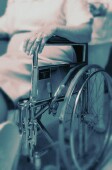Relapse rates with daclizumab were lower than with a standard therapy, but side effects were greater
THURSDAY, Oct. 8, 2015 (HealthDay News) — Multiple sclerosis patients taking daclizumab high yield process (HYP), a humanized monoclonal antibody that binds to CD25 (alpha subunit of the interleukin-2 receptor) and modulates interleukin-2 signaling, experienced lower relapse rates but more side effects than patients receiving interferon beta-1a, new research indicates. The study was published in the Oct. 8 issue of the New England Journal of Medicine.
In the new study, led by scientists at University Hospital Basel in Switzerland, 1,841 patients with relapsing-remitting multiple sclerosis were randomly assigned to receive either daclizumab HYP or interferon beta-1a over a period averaging about two years.
While daclizumab recipients experienced much lower relapse rates than those on interferon beta-1a, disability progression 12 weeks after the study’s start was similar in both groups — 16 percent with daclizumab and 20 percent with interferon beta-1a. But side effects, including serious infections and cutaneous events such as rash or eczema, were far more common among daclizumab recipients.
“Among patients with relapsing-remitting multiple sclerosis, daclizumab HYP showed efficacy superior to that of interferon beta-1a with regard to the annualized relapse rate and lesions, as assessed by means of magnetic resonance imaging, but was not associated with a significantly lower risk of disability progression confirmed at 12 weeks,” the authors conclude. “The rates of infection, rash, and abnormalities on liver-function testing were higher with daclizumab HYP than with interferon beta-1a.”
The study was funded by Biogen and AbbVie Biotherapeutics, the manufacturers of daclizumab.
Full Text (subscription or payment may be required)
Copyright © 2015 HealthDay. All rights reserved.








